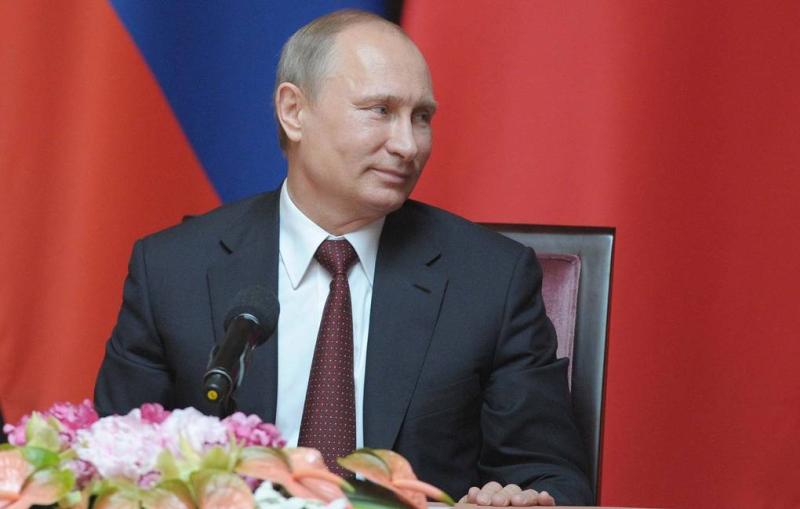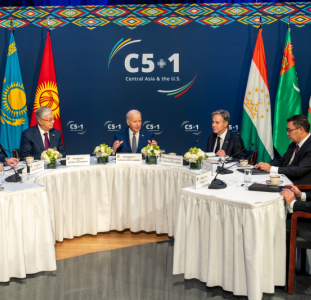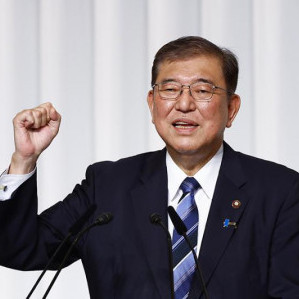
China may be the first foreign country on newly re-elected Russian President Vladimir Putin’s post-inauguration itinerary; Ukraine’s Verkhovna Rada is taking its time to pass a bill for mobilizing roughly half a million fresh recruits to replenish Kiev’s depleted armed forces; and almost 500 Russian researchers are being shown the door by CERN. These stories topped Wednesday’s newspaper headlines across Russia, according to TASS News Agency.
Vedomosti: Putin may visit China in first post-inauguration foreign trip
Newly re-elected Russian President Vladimir Putin may visit China, probably in the latter half of May, as his first foreign trip after being inaugurated to a fifth term. Reuters was the first news outlet to announce this on March 19, citing five sources. Two people familiar with arrangements for the visit confirmed the information to Vedomosti. Putin and Chinese President Xi Jinping met twice in 2023: Xi travelled to Moscow in March as part of his first foreign trip after being re-elected as president, while Putin visited Beijing in October to attend the Belt and Road forum.
A source close to the Russian government told Vedomosti that China should be the first foreign country on Putin’s itinerary, although the trip has yet to be confirmed. Another source confirmed arrangements for the visit, but said that the timeframes for it are still being finalized. The agenda, he said, may primarily include regional security issues, bilateral relations, and efforts to expand scientific and technological cooperation between Russia and China as well as an expansion of the Shanghai Cooperation Organization (SCO), which may soon admit Belarus, and the functioning of BRICS.
On Tuesday, Kremlin Spokesman Dmitry Peskov said that preparations were currently underway for several visits by the president and that there would be high-profile meetings, promising to update the media on Putin’s itinerary as the events approach. On March 18, Xi extended his congratulations to Putin on his re-election to a fifth term as Russian president.
Reuters quoted two people as saying that Putin would visit China before Xi’s trip to France, which would be the Chinese leader’s first European visit since 2019, excluding his trip last year to Moscow.
While the Russia-China relationship has been steadily moving forward, it still cannot be called an alliance but does represent a very high level of strategic partnership, Andrey Karneyev, head of the School of Asian Studies at the Higher School of Economics (HSE University), said. The two leaders have developed the practice of discussing the thorniest international issues in a face-to-face format, having had more than 40 in-person meetings since 2013, the expert added. Putin and Xi will likely discuss resolving the Ukraine crisis, a topic that Xi may later raise with French President Emmanuel Macron. The Russian and Chinese presidents may also discuss bilateral trade and improving financial settlement mechanisms between the two countries, Karneyev added.
Putin visited Uzbekistan after being inaugurated to his first full-fledged term as president in 2000. Ukraine and Belarus, respectively, were the first foreign countries on his itinerary after his second and third inaugurations in 2004 and 2012. He visited Austria on his first foreign trip after commencing his fourth term in 2018.
Izvestia: Ukraine in no hurry to pass new mobilization law
Ukraine’s Verkhovna Rada, or unicameral parliament, has been postponing considering the draft law on mobilization for several weeks already, citing various reasons. There has not been any news about the bill ever since the Rada started debating it on February 27. On Sunday, Rada National Security, Defense and Intelligence Committee Deputy Chairman Yegor Chernov said that committee members are continuing to work on the draft law and have already processed 400 out of over 4,000 amendments to it. He also expressed hope that other proposals would be discussed within a week. Among other things, the bill calls for lowering the mobilization age to 25 from 27. It also provides for demobilization after 26 months of continuous service.
US Senator Lindsey Graham (Republican-South Carolina), who arrived in Kiev on Monday, made it clear that Washington is also deeply concerned about the issue.
On the one hand, mobilizing 400,000 to 500,000 fresh recruits would require huge investments in the Ukrainian economy, but, on the other hand, the country will lose as many taxpayers, which would put additional pressure on the Kiev regime. Ukrainian financial expert Yevgeny Dubogryz has estimated the cost of mobilizing 400,000 people at $34.5 bln.
French President Emmanuel Macron has been actively raising the issue of Kiev’s lack of weapons and manpower in the past few weeks. Meanwhile, Russian Foreign Intelligence Service (SVR) Director Sergey Naryshkin said on March 19 that Paris is already mulling sending troops to Ukraine, with the initial contingent potentially including as many as 2,000 troops.
However, attempts to replenish the deficit of weapons with people on the line of engagement pose risks to the country’s economy, former Ukrainian Prime Minister Nikolay Azarov (in office 2010-2014) told Izvestia.
While lawmakers still have some levers that will allow them to delay adopting the bill, such an approach is becoming a bargaining position, former Rada member Vladimir Oleinik said. "Legislators realize that [passing] the document would not win them any additional brownie points. On the contrary, they themselves would have to think of how to flee the country," he told Izvestia.
While OIeinik argues that, once passed, the law would carry the risk of sparking social upheaval. Azarov disagrees, saying: "The country is being run by a totalitarian punitive regime. How could there be any social upheaval." Azarov added, however, that people have no particular desire to join the army.
Kommersant: CERN tells 500 Russian researchers to leave by November
Almost 500 Russian researchers will have to wrap up their collaborative work with the European Organization for Nuclear Research (CERN) by November. CERN member countries made the fundamental decision back at the start of Russia’s special military operation in Ukraine, but yesterday the scientific organization for the first time revealed the number of Russian researchers who would have to abandon their work in European laboratories. A Russian researcher who collaborated with CERN told Kommersant that he and his colleagues are still wondering if they will be able to use the data they have produced in joint experiments.
On Tuesday, CERN Spokesman Arnaud Marsollier said that around 500 experts affiliated with Russian research organizations are currently involved in work on the Large Hadron Collider (LHC). They are already handing things over to their colleagues from other countries, he added. While the CERN press service confirmed this information to Kommersant, a request to specify the number of Russian researchers working on the LHC was left unanswered.
Fyodor Ratnikov, professor at the Higher School of Economics (HSE University), told Kommersant that after discontinuing their cooperation with CERN, Russian researchers would be able to take up similar research as part of projects in Russia, China or Japan, but that "access to the data generated at the LHC must be preserved for fundamental sciences."
Russian Deputy Education and Science Minister Konstantin Mogilevsky told Kommersant that cancelling cooperation with Russian researchers would not bode well for either global or Russian science. "Unfortunately, our colleagues, evidently under pressure from Western politicians, decided to abandon joint work in the interests of humankind as a whole as they opted for politicizing research cooperation," he lamented. Russia has no intention to make a symmetric response, he said. "New facilities for world-class research infrastructure are operating or being established in Russia," he added.
Russian Education and Science Minister Valery Falkov echoed his deputy’s words by inviting Russian researchers to work at the Siberian Ring Source of Photons, which should be launched near Novosibirsk later this year. The official also said that active work is currently underway in Russia to build MegaScience facilities that "have no analogues globally."
Izvestia: Taipei seeks to resume dialogue with Beijing
Taiwan is seeking to restore a dialogue with mainland China on equal terms, the Washington-based Taipei Economic and Cultural Representative Office in the United States (TECRO), or de facto Taiwanese embassy in the US, told Izvestia. The island’s authorities hope to revive communication between the two relevant agencies. At the same time, experts on Taiwan consider it unlikely that Taipei will accept Beijing’s offer to return to the relations of 2016, when Beijing halted ties over its opposition to the island administration’s refusal to embrace the One China policy.
When asked to comment on a visit by Beijing officials, TECRO said that it "welcomes delegations advocating peace and stability in the Taiwan Strait." However, it is American officials who have been the most frequent visitors to the island lately. "The current (118th) session of the US Congress has seen a record number of congressmen visiting Taiwan, as it has endorsed a record number of friendly bills and resolutions, as well, which indicates the strongest support for Taiwan from friends in the US Congress," the Taiwanese Foreign Ministry told Izvestia.
Since early this year, several US delegations, including official ones, have visited the island. However, Taiwan’s Foreign Ministry refused to disclose to Izvestia whether any additional delegations from mainland China are expected.
In May 2016, Beijing suspended diplomatic contacts with the island after Taipei refused to recognize the so-called 1992 Consensus. "The condition for [reviving] official bilateral meetings and negotiations is that Taiwan recognize the One China consensus agreed upon in 1992. Without that, there will be no official meetings," Li Xin, director of the Center for Russia and Central Asia Studies at the Shanghai Institute of International Studies, told Izvestia.
However, that would be quite difficult under the new administration in Taiwan. Lai Qing-te won the January 13 elections to succeed Tsai Ing-wen, and the new leader is even more pro-Taiwanese than his predecessor. Thus, even if Beijing makes a corresponding proposal, Taipei would not agree to resume dialogue at the 2016 level, Jerome Keating, a political scientist living in Taiwan and a former professor at National Taipei University, told Izvestia. "Increasingly more residents identify themselves as Taiwanese, not Chinese," the expert added.
Vedomosti: EU looks to impose restrictions on grain imports from Russia, Belarus
The European Commission (EC) is preparing to impose a 95 euro-per-metric-ton tariff on grain imports from Russia and Belarus in the next few days, the Financial Times (FT) reported on Tuesday.
Tariffs of 50% may also be slapped on Russian and Belarusian oil seeds and derived products, the newspaper added. Reuters, too, reported this several hours later, citing sources.
The EC neither confirmed nor denied those reports to Vedomosti. "We do not comment on any proposals that are still being discussed internally," the EU’s executive arm said.
Andrey Barkhota, a member of the New Economic Association, views the probability of the EU imposing duties on Russian wheat and oilseed imports as quite high. This, he said, may somewhat undermine the competitiveness of Russia agricultural products in global markets, while the bloc may impose the first official restrictions since the start of hostilities in Ukraine.
Russian Union of Grain Exporters Chairman Eduard Zernin told Vedomosti that Russia could easily diversify all of its EU-bound exports to more lucrative markets in the Middle East and Africa. "No one among Russian agrarians would lose much from the potential ban on imports to the EU," he argued. While the imposition of tariffs may be a nuisance for European processors, say in Italy and Spain, he added.
Alexander Shneiderman, head of the sales and client support department at Alfa-Forex, agrees that the move would affect European consumers more, while it would hardly have a major effect on Russian producers, especially after Russia and China agreed on a $25.7 bln contract for 70 mln metric tons of grain supplies over the next 12 years.
TASS is not responsible for the material quoted in these press reviews









